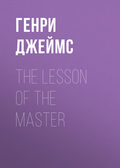
Генри Джеймс
Washington Square
XX
On the morrow, in the afternoon, she heard his voice at the door, and his step in the hall. She received him in the big, bright front parlour, and she instructed the servant that if any one should call she was particularly engaged. She was not afraid of her father’s coming in, for at that hour he was always driving about town. When Morris stood there before her, the first thing that she was conscious of was that he was even more beautiful to look at than fond recollection had painted him; the next was that he had pressed her in his arms. When she was free again it appeared to her that she had now indeed thrown herself into the gulf of defiance, and even, for an instant, that she had been married to him.
He told her that she had been very cruel, and had made him very unhappy; and Catherine felt acutely the difficulty of her destiny, which forced her to give pain in such opposite quarters. But she wished that, instead of reproaches, however tender, he would give her help; he was certainly wise enough, and clever enough, to invent some issue from their troubles. She expressed this belief, and Morris received the assurance as if he thought it natural; but he interrogated, at first—as was natural too—rather than committed himself to marking out a course.
“You should not have made me wait so long,” he said. “I don’t know how I have been living; every hour seemed like years. You should have decided sooner.”
“Decided?” Catherine asked.
“Decided whether you would keep me or give me up.”
“Oh, Morris,” she cried, with a long tender murmur, “I never thought of giving you up!”
“What, then, were you waiting for?” The young man was ardently logical.
“I thought my father might—might—” and she hesitated.
“Might see how unhappy you were?”
“Oh no! But that he might look at it differently.”
“And now you have sent for me to tell me that at last he does so. Is that it?”
This hypothetical optimism gave the poor girl a pang. “No, Morris,” she said solemnly, “he looks at it still in the same way.”
“Then why have you sent for me?”
“Because I wanted to see you!” cried Catherine piteously.
“That’s an excellent reason, surely. But did you want to look at me only? Have you nothing to tell me?”
His beautiful persuasive eyes were fixed upon her face, and she wondered what answer would be noble enough to make to such a gaze as that. For a moment her own eyes took it in, and then—“I did want to look at you!” she said gently. But after this speech, most inconsistently, she hid her face.
Morris watched her for a moment, attentively. “Will you marry me to-morrow?” he asked suddenly.
“To-morrow?”
“Next week, then. Any time within a month.”
“Isn’t it better to wait?” said Catherine.
“To wait for what?”
She hardly knew for what; but this tremendous leap alarmed her. “Till we have thought about it a little more.”
He shook his head, sadly and reproachfully. “I thought you had been thinking about it these three weeks. Do you want to turn it over in your mind for five years? You have given me more than time enough. My poor girl,” he added in a moment, “you are not sincere!”
Catherine coloured from brow to chin, and her eyes filled with tears. “Oh, how can you say that?” she murmured.
“Why, you must take me or leave me,” said Morris, very reasonably. “You can’t please your father and me both; you must choose between us.”
“I have chosen you!” she said passionately.
“Then marry me next week.”
She stood gazing at him. “Isn’t there any other way?”
“None that I know of for arriving at the same result. If there is, I should be happy to hear of it.”
Catherine could think of nothing of the kind, and Morris’s luminosity seemed almost pitiless. The only thing she could think of was that her father might, after all, come round, and she articulated, with an awkward sense of her helplessness in doing so, a wish that this miracle might happen.
“Do you think it is in the least degree likely?” Morris asked.
“It would be, if he could only know you!”
“He can know me if he will. What is to prevent it?”
“His ideas, his reasons,” said Catherine. “They are so—so terribly strong.” She trembled with the recollection of them yet.
“Strong?” cried Morris. “I would rather you should think them weak.”
“Oh, nothing about my father is weak!” said the girl.
Morris turned away, walking to the window, where he stood looking out. “You are terribly afraid of him!” he remarked at last.
She felt no impulse to deny it, because she had no shame in it; for if it was no honour to herself, at least it was an honour to him. “I suppose I must be,” she said simply.
“Then you don’t love me—not as I love you. If you fear your father more than you love me, then your love is not what I hoped it was.”
“Ah, my friend!” she said, going to him.
“Do I fear anything?” he demanded, turning round on her. “For your sake what am I not ready to face?”
“You are noble—you are brave!” she answered, stopping short at a distance that was almost respectful.
“Small good it does me, if you are so timid.”
“I don’t think that I am—really,” said Catherine.
“I don’t know what you mean by ‘really.’ It is really enough to make us miserable.”
“I should be strong enough to wait—to wait a long time.”
“And suppose after a long time your father should hate me worse than ever?”
“He wouldn’t—he couldn’t!”
“He would be touched by my fidelity? Is that what you mean? If he is so easily touched, then why should you be afraid of him?”
This was much to the point, and Catherine was struck by it. “I will try not to be,” she said. And she stood there submissively, the image, in advance, of a dutiful and responsible wife. This image could not fail to recommend itself to Morris Townsend, and he continued to give proof of the high estimation in which he held her. It could only have been at the prompting of such a sentiment that he presently mentioned to her that the course recommended by Mrs. Penniman was an immediate union, regardless of consequences.
“Yes, Aunt Penniman would like that,” Catherine said simply—and yet with a certain shrewdness. It must, however, have been in pure simplicity, and from motives quite untouched by sarcasm, that, a few moments after, she went on to say to Morris that her father had given her a message for him. It was quite on her conscience to deliver this message, and had the mission been ten times more painful she would have as scrupulously performed it. “He told me to tell you—to tell you very distinctly, and directly from himself, that if I marry without his consent, I shall not inherit a penny of his fortune. He made a great point of this. He seemed to think—he seemed to think—”
Morris flushed, as any young man of spirit might have flushed at an imputation of baseness.
“What did he seem to think?”
“That it would make a difference.”
“It will make a difference—in many things. We shall be by many thousands of dollars the poorer; and that is a great difference. But it will make none in my affection.”
“We shall not want the money,” said Catherine; “for you know I have a good deal myself.”
“Yes, my dear girl, I know you have something. And he can’t touch that!”
“He would never,” said Catherine. “My mother left it to me.”
Morris was silent a while. “He was very positive about this, was he?” he asked at last. “He thought such a message would annoy me terribly, and make me throw off the mask, eh?”
“I don’t know what he thought,” said Catherine wearily.
“Please tell him that I care for his message as much as for that!” And Morris snapped his fingers sonorously.
“I don’t think I could tell him that.”
“Do you know you sometimes disappoint me?” said Morris.
“I should think I might. I disappoint every one—father and Aunt Penniman.”
“Well, it doesn’t matter with me, because I am fonder of you than they are.”
“Yes, Morris,” said the girl, with her imagination—what there was of it—swimming in this happy truth, which seemed, after all, invidious to no one.
“Is it your belief that he will stick to it—stick to it for ever, to this idea of disinheriting you?—that your goodness and patience will never wear out his cruelty?”
“The trouble is that if I marry you, he will think I am not good. He will think that a proof.”
“Ah, then, he will never forgive you!”
This idea, sharply expressed by Morris’s handsome lips, renewed for a moment, to the poor girl’s temporarily pacified conscience, all its dreadful vividness. “Oh, you must love me very much!” she cried.
“There is no doubt of that, my dear!” her lover rejoined. “You don’t like that word ‘disinherited,’” he added in a moment.
“It isn’t the money; it is that he should—that he should feel so.”
“I suppose it seems to you a kind of curse,” said Morris. “It must be very dismal. But don’t you think,” he went on presently, “that if you were to try to be very clever, and to set rightly about it, you might in the end conjure it away? Don’t you think,” he continued further, in a tone of sympathetic speculation, “that a really clever woman, in your place, might bring him round at last? Don’t you think?”
Here, suddenly, Morris was interrupted; these ingenious inquiries had not reached Catherine’s ears. The terrible word “disinheritance,” with all its impressive moral reprobation, was still ringing there; seemed indeed to gather force as it lingered. The mortal chill of her situation struck more deeply into her child-like heart, and she was overwhelmed by a feeling of loneliness and danger. But her refuge was there, close to her, and she put out her hands to grasp it. “Ah, Morris,” she said, with a shudder, “I will marry you as soon as you please.” And she surrendered herself, leaning her head on his shoulder.
“My dear good girl!” he exclaimed, looking down at his prize. And then he looked up again, rather vaguely, with parted lips and lifted eyebrows.
XXI
Dr. Sloper very soon imparted his conviction to Mrs. Almond, in the same terms in which he had announced it to himself. “She’s going to stick, by Jove! she’s going to stick.”
“Do you mean that she is going to marry him?” Mrs. Almond inquired.
“I don’t know that; but she is not going to break down. She is going to drag out the engagement, in the hope of making me relent.”
“And shall you not relent?”
“Shall a geometrical proposition relent? I am not so superficial.”
“Doesn’t geometry treat of surfaces?” asked Mrs. Almond, who, as we know, was clever, smiling.
“Yes; but it treats of them profoundly. Catherine and her young man are my surfaces; I have taken their measure.”
“You speak as if it surprised you.”
“It is immense; there will be a great deal to observe.”
“You are shockingly cold-blooded!” said Mrs. Almond.
“I need to be with all this hot blood about me. Young Townsend indeed is cool; I must allow him that merit.”
“I can’t judge him,” Mrs. Almond answered; “but I am not at all surprised at Catherine.”
“I confess I am a little; she must have been so deucedly divided and bothered.”
“Say it amuses you outright! I don’t see why it should be such a joke that your daughter adores you.”
“It is the point where the adoration stops that I find it interesting to fix.”
“It stops where the other sentiment begins.”
“Not at all—that would be simple enough. The two things are extremely mixed up, and the mixture is extremely odd. It will produce some third element, and that’s what I am waiting to see. I wait with suspense—with positive excitement; and that is a sort of emotion that I didn’t suppose Catherine would ever provide for me. I am really very much obliged to her.”
“She will cling,” said Mrs. Almond; “she will certainly cling.”
“Yes; as I say, she will stick.”
“Cling is prettier. That’s what those very simple natures always do, and nothing could be simpler than Catherine. She doesn’t take many impressions; but when she takes one she keeps it. She is like a copper kettle that receives a dent; you may polish up the kettle, but you can’t efface the mark.”
“We must try and polish up Catherine,” said the Doctor. “I will take her to Europe.”
“She won’t forget him in Europe.”
“He will forget her, then.”
Mrs. Almond looked grave. “Should you really like that?”
“Extremely!” said the Doctor.
Mrs. Penniman, meanwhile, lost little time in putting herself again in communication with Morris Townsend. She requested him to favour her with another interview, but she did not on this occasion select an oyster saloon as the scene of their meeting. She proposed that he should join her at the door of a certain church, after service on Sunday afternoon, and she was careful not to appoint the place of worship which she usually visited, and where, as she said, the congregation would have spied upon her. She picked out a less elegant resort, and on issuing from its portal at the hour she had fixed she saw the young man standing apart. She offered him no recognition till she had crossed the street and he had followed her to some distance. Here, with a smile—“Excuse my apparent want of cordiality,” she said. “You know what to believe about that. Prudence before everything.” And on his asking her in what direction they should walk, “Where we shall be least observed,” she murmured.
Morris was not in high good-humour, and his response to this speech was not particularly gallant. “I don’t flatter myself we shall be much observed anywhere.” Then he turned recklessly toward the centre of the town. “I hope you have come to tell me that he has knocked under,” he went on.
“I am afraid I am not altogether a harbinger of good; and yet, too, I am to a certain extent a messenger of peace. I have been thinking a great deal, Mr. Townsend,” said Mrs. Penniman.
“You think too much.”
“I suppose I do; but I can’t help it, my mind is so terribly active. When I give myself, I give myself. I pay the penalty in my headaches, my famous headaches—a perfect circlet of pain! But I carry it as a queen carries her crown. Would you believe that I have one now? I wouldn’t, however, have missed our rendezvous for anything. I have something very important to tell you.”
“Well, let’s have it,” said Morris.
“I was perhaps a little headlong the other day in advising you to marry immediately. I have been thinking it over, and now I see it just a little differently.”
“You seem to have a great many different ways of seeing the same object.”
“Their number is infinite!” said Mrs. Penniman, in a tone which seemed to suggest that this convenient faculty was one of her brightest attributes.
“I recommend you to take one way and stick to it,” Morris replied.
“Ah! but it isn’t easy to choose. My imagination is never quiet, never satisfied. It makes me a bad adviser, perhaps; but it makes me a capital friend!”
“A capital friend who gives bad advice!” said Morris.
“Not intentionally—and who hurries off, at every risk, to make the most humble excuses!”
“Well, what do you advise me now?”
“To be very patient; to watch and wait.”
“And is that bad advice or good?”
“That is not for me to say,” Mrs. Penniman rejoined, with some dignity. “I only pretend it’s sincere.”
“And will you come to me next week and recommend something different and equally sincere?”
“I may come to you next week and tell you that I am in the streets!”
“In the streets?”
“I have had a terrible scene with my brother, and he threatens, if anything happens, to turn me out of the house. You know I am a poor woman.”
Morris had a speculative idea that she had a little property; but he naturally did not press this.
“I should be very sorry to see you suffer martyrdom for me,” he said. “But you make your brother out a regular Turk.”
Mrs. Penniman hesitated a little.
“I certainly do not regard Austin as a satisfactory Christian.”
“And am I to wait till he is converted?”
“Wait, at any rate, till he is less violent. Bide your time, Mr. Townsend; remember the prize is great!”
Morris walked along some time in silence, tapping the railings and gateposts very sharply with his stick.
“You certainly are devilish inconsistent!” he broke out at last. “I have already got Catherine to consent to a private marriage.”
Mrs. Penniman was indeed inconsistent, for at this news she gave a little jump of gratification.
“Oh! when and where?” she cried. And then she stopped short.
Morris was a little vague about this.
“That isn’t fixed; but she consents. It’s deuced awkward, now, to back out.”
Mrs. Penniman, as I say, had stopped short; and she stood there with her eyes fixed brilliantly on her companion.
“Mr. Townsend,” she proceeded, “shall I tell you something? Catherine loves you so much that you may do anything.”
This declaration was slightly ambiguous, and Morris opened his eyes.
“I am happy to hear it! But what do you mean by ‘anything’?”
“You may postpone—you may change about; she won’t think the worse of you.”
Morris stood there still, with his raised eyebrows; then he said simply and rather dryly—“Ah!” After this he remarked to Mrs. Penniman that if she walked so slowly she would attract notice, and he succeeded, after a fashion, in hurrying her back to the domicile of which her tenure had become so insecure.
XXII
He had slightly misrepresented the matter in saying that Catherine had consented to take the great step. We left her just now declaring that she would burn her ships behind her; but Morris, after having elicited this declaration, had become conscious of good reasons for not taking it up. He avoided, gracefully enough, fixing a day, though he left her under the impression that he had his eye on one. Catherine may have had her difficulties; but those of her circumspect suitor are also worthy of consideration. The prize was certainly great; but it was only to be won by striking the happy mean between precipitancy and caution. It would be all very well to take one’s jump and trust to Providence; Providence was more especially on the side of clever people, and clever people were known by an indisposition to risk their bones. The ultimate reward of a union with a young woman who was both unattractive and impoverished ought to be connected with immediate disadvantages by some very palpable chain. Between the fear of losing Catherine and her possible fortune altogether, and the fear of taking her too soon and finding this possible fortune as void of actuality as a collection of emptied bottles, it was not comfortable for Morris Townsend to choose; a fact that should be remembered by readers disposed to judge harshly of a young man who may have struck them as making but an indifferently successful use of fine natural parts. He had not forgotten that in any event Catherine had her own ten thousand a year; he had devoted an abundance of meditation to this circumstance. But with his fine parts he rated himself high, and he had a perfectly definite appreciation of his value, which seemed to him inadequately represented by the sum I have mentioned. At the same time he reminded himself that this sum was considerable, that everything is relative, and that if a modest income is less desirable than a large one, the complete absence of revenue is nowhere accounted an advantage. These reflexions gave him plenty of occupation, and made it necessary that he should trim his sail. Dr. Sloper’s opposition was the unknown quantity in the problem he had to work out. The natural way to work it out was by marrying Catherine; but in mathematics there are many short cuts, and Morris was not without a hope that he should yet discover one. When Catherine took him at his word and consented to renounce the attempt to mollify her father, he drew back skilfully enough, as I have said, and kept the wedding-day still an open question. Her faith in his sincerity was so complete that she was incapable of suspecting that he was playing with her; her trouble just now was of another kind. The poor girl had an admirable sense of honour; and from the moment she had brought herself to the point of violating her father’s wish, it seemed to her that she had no right to enjoy his protection. It was on her conscience that she ought to live under his roof only so long as she conformed to his wisdom. There was a great deal of glory in such a position, but poor Catherine felt that she had forfeited her claim to it. She had cast her lot with a young man against whom he had solemnly warned her, and broken the contract under which he provided her with a happy home. She could not give up the young man, so she must leave the home; and the sooner the object of her preference offered her another the sooner her situation would lose its awkward twist. This was close reasoning; but it was commingled with an infinite amount of merely instinctive penitence. Catherine’s days at this time were dismal, and the weight of some of her hours was almost more than she could bear. Her father never looked at her, never spoke to her. He knew perfectly what he was about, and this was part of a plan. She looked at him as much as she dared (for she was afraid of seeming to offer herself to his observation), and she pitied him for the sorrow she had brought upon him. She held up her head and busied her hands, and went about her daily occupations; and when the state of things in Washington Square seemed intolerable, she closed her eyes and indulged herself with an intellectual vision of the man for whose sake she had broken a sacred law. Mrs. Penniman, of the three persons in Washington Square, had much the most of the manner that belongs to a great crisis. If Catherine was quiet, she was quietly quiet, as I may say, and her pathetic effects, which there was no one to notice, were entirely unstudied and unintended. If the Doctor was stiff and dry and absolutely indifferent to the presence of his companions, it was so lightly, neatly, easily done, that you would have had to know him well to discover that, on the whole, he rather enjoyed having to be so disagreeable. But Mrs. Penniman was elaborately reserved and significantly silent; there was a richer rustle in the very deliberate movements to which she confined herself, and when she occasionally spoke, in connexion with some very trivial event, she had the air of meaning something deeper than what she said. Between Catherine and her father nothing had passed since the evening she went to speak to him in his study. She had something to say to him—it seemed to her she ought to say it; but she kept it back, for fear of irritating him. He also had something to say to her; but he was determined not to speak first. He was interested, as we know, in seeing how, if she were left to herself, she would “stick.” At last she told him she had seen Morris Townsend again, and that their relations remained quite the same.
“I think we shall marry—before very long. And probably, meanwhile, I shall see him rather often; about once a week, not more.”
The Doctor looked at her coldly from head to foot, as if she had been a stranger. It was the first time his eyes had rested on her for a week, which was fortunate, if that was to be their expression. “Why not three times a day?” he asked. “What prevents your meeting as often as you choose?”
She turned away a moment; there were tears in her eyes. Then she said, “It is better once a week.”
“I don’t see how it is better. It is as bad as it can be. If you flatter yourself that I care for little modifications of that sort, you are very much mistaken. It is as wrong of you to see him once a week as it would be to see him all day long. Not that it matters to me, however.”
Catherine tried to follow these words, but they seemed to lead towards a vague horror from which she recoiled. “I think we shall marry pretty soon,” she repeated at last.
Her father gave her his dreadful look again, as if she were some one else. “Why do you tell me that? It’s no concern of mine.”
“Oh, father!” she broke out, “don’t you care, even if you do feel so?”
“Not a button. Once you marry, it’s quite the same to me when or where or why you do it; and if you think to compound for your folly by hoisting your flag in this way, you may spare yourself the trouble.”
With this he turned away. But the next day he spoke to her of his own accord, and his manner was somewhat changed. “Shall you be married within the next four or five months?” he asked.
“I don’t know, father,” said Catherine. “It is not very easy for us to make up our minds.”
“Put it off, then, for six months, and in the meantime I will take you to Europe. I should like you very much to go.”
It gave her such delight, after his words of the day before, to hear that he should “like” her to do something, and that he still had in his heart any of the tenderness of preference, that she gave a little exclamation of joy. But then she became conscious that Morris was not included in this proposal, and that—as regards really going—she would greatly prefer to remain at home with him. But she blushed, none the less, more comfortably than she had done of late. “It would be delightful to go to Europe,” she remarked, with a sense that the idea was not original, and that her tone was not all it might be.
“Very well, then, we will go. Pack up your clothes.”
“I had better tell Mr. Townsend,” said Catherine.
Her father fixed his cold eyes upon her. “If you mean that you had better ask his leave, all that remains to me is to hope he will give it.”
The girl was sharply touched by the pathetic ring of the words; it was the most calculated, the most dramatic little speech the Doctor had ever uttered. She felt that it was a great thing for her, under the circumstances, to have this fine opportunity of showing him her respect; and yet there was something else that she felt as well, and that she presently expressed. “I sometimes think that if I do what you dislike so much, I ought not to stay with you.”
“To stay with me?”
“If I live with you, I ought to obey you.”
“If that’s your theory, it’s certainly mine,” said the Doctor, with a dry laugh.
“But if I don’t obey you, I ought not to live with you—to enjoy your kindness and protection.”
This striking argument gave the Doctor a sudden sense of having underestimated his daughter; it seemed even more than worthy of a young woman who had revealed the quality of unaggressive obstinacy. But it displeased him—displeased him deeply, and he signified as much. “That idea is in very bad taste,” he said. “Did you get it from Mr. Townsend?”
“Oh no; it’s my own!” said Catherine eagerly.
“Keep it to yourself, then,” her father answered, more than ever determined she should go to Europe.






